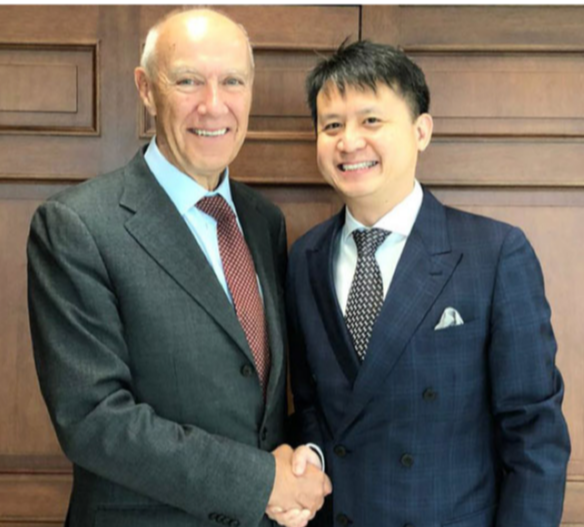
#2 The G|O Briefing, Tuesday, May 10, 2020
Singapore's Daren Tang confirmed as Director General of the World Intellectual Property Organization.
This is an onsite edited excerpt of the G|O Briefing newsletter
Today in The Geneva Observer, last Friday (8th May), Daren Tang was confirmed as Director General (DG) of the World Intellectual Property Organization (WIPO) for a six-year term starting in October 2020. Succeeding Australian Francis Gurry, he is the first Singaporean to lead a UN agency and WIPO’s first Asian DG. His appointment is seen as a win for the US, who coordinated pushback against increasing Chinese influence at the top of UN agencies.
While Mr. Tang’s confirmation last week was smooth, the nomination process was anything but. For those of you who missed it, he beat China’s preferred candidate, WIPO Deputy Director General Wang Binying, on a second-round vote at the Committee stage in early March. This was also seen as a personal victory for US Ambassador to the UN in Geneva, Andrew Bremberg who led behind-the-scenes efforts during the nomination process In his acceptance speech, Tang thanked the chair of the committee, French Ambassador François Rivasseau, in a tacit acknowledgment of Ambassador Rivasseau’s role in delivering EU votes, thus joining the US and Japan in a one-off coalition in opposition to Beijing.
The Trump administration may publicly talk down multilateralism, but their disdain clearly doesn’t extend to letting China increase its influence unchecked.
The Trump administration may publicly talk down multilateralism, but their disdain clearly doesn’t extend to letting China increase its influence unchecked across the board—particularly after a US-backed candidate and a French candidate split the ‘not-China’ vote to lead the Food and Agriculture Organization (FAO) last summer. Not counting leaders from countries deeply indebted to China, Chinese nationals now head four out of 15 UN agencies: the FAO, the International Civil Aviation Organization (ICAO), the Industrial Development Organization (UNIDO), and the International Telecommunication Union (ITU).
Although the ITU is our editor’s current favorite entry for Geneva’s coveted ’most influential agency you’ve probably "never heard of award," WIPO is certainly up there. Nicely described by a fellow reporter as “deeply worthwhile but not shudderingly sexy ”, it promotes the protection of Intellectual Property (IP) and the international IP system around the world. As such, it provides a number of key IP tools and services and acts as a massive repository of IP law information, patent applications, and commercially sensitive information—including unpublished materials—from over 200 jurisdictions. As China is notorious for IP infringement, the American James Pooley, a former WIPO deputy DG, described putting China at the helm as “like appointing the fox to guard the hen house,” saying further that it would allow China to access “the secrets of the world’s future technology before anyone else.”
A trend paused or ended? With the leadership of ILO, IFAD, UNWTO, UNESCO, and UNIDO up for grabs in 2021, then WHO and the ICAO in 2022, watch this space …
Elsewhere in International Geneva's Ecosystem
In cost of Coronavirus news, UNHCR has revised its estimate of the humanitarian cost of the coronavirus crisis. Calling for US$6.7 billion for the Global Humanitarian Response Plan, the new cost almost triples the US$2 billion appeal issued at the end of March. This also comes as WHO estimated it needs a further US$1.3 billion between now and the end of 2020 to deliver its Strategic Preparedness and Response Plan for COVID-19. As deconfinement begins across Europe, the peak of the disease in the poorest countries is not expected for at least three months, and the cost of the global response is likely to keep rising.
And finally, in unavoidable WHO news, preparations are underway for next week’s World Health Assembly (WHA). Normally lasting a full week, the 73rd WHA is exceptionally going to be held virtually, and its agenda has been reduced to fit two days (18th and 19th May). The paired-down, de minimis session will focus principally on the COVID-19 crisis: normal committees will not convene, and the Assembly will be invited to suspend the session until it can meet again later in 2020.
Negotiations are underway behind the scenes on the EU’s proposed resolution on COVID-19 (see Priti Patnaik’s latest piece) in her series on the negotiations, a Health Policy Watch report, and a Reuters dispatch. For WHO to host a large-scale Assembly with health officials from around the world in the middle of a global pandemic inevitably poses some practical difficulties, the least of which being that everyone is understandably busy elsewhere. However, the question is whether the WHA remains the major forum for discussing global health issues. We will go into further detail on the preparations for WHA and what to expect
in Thursday’s newsletter.
All the best from The Geneva Observer
